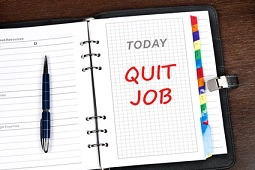
The fact is that there is never a perfect time to leave. You just have to look at the situation and make your best decision. I am a fan of the conservative option. That is, you should leave once your business is ready to give you a salary. For many entrepreneurs, this means that they should stay at work while growing their company.
Although it’s not easy, many people have been able to start a business while working full time. This undertaking can be a lot of work. But if you do it correctly, this option has the lowest risk. Unfortunately, this option does not work in every circumstance. Some businesses need you to work in them full time before they produce any revenues.
Before jumping ship, you should be prepared. Here are some questions that you should answer. They will prepare you for what’s ahead:
Have you worked out a personal expenses budget?
Before you consider quitting your job, you should build a budget for you and your family. At a minimum, this budget should cover all your bare necessities. However, you’d be wise to pad your budget a little to give you some flexibility. Contrary to popular belief, eating beans and ramen noodles every night while growing a startup gets tiring very soon. Your budget should cover:
- Housing expenses
- Clothing
- Insurance
- Vehicle expenses (repairs and gas)
- Healthcare
- Food
- Utilities
- Entertainment (you will need it – trust me!)
- Incidentals
Here is one easy trick I have used in the past to build an accurate budget. Start keeping track of all your income and expenses using Quicken. This is fairly easy because you can download all your online statements. Keep track of your expenses for three months and categorize them as best as you can. Then, use a Quicken expense report to create an extremely accurate budget. Yes, it’s a bit tedious, but it works better than trying to just use a template.
Have you built a reserve?
If you are quitting your job to work at a business that will not pay a salary for the foreseeable future, you should build a cash reserve. Obviously, don’t quit until your reserve is built. So, start early. This reserve is what you will use to pay all your living expenses. The size of the reserve should be based on the budget you developed from the previous question and how long it will take your company to start paying you a salary.
Keep in mind that most people seriously underestimate how long it will take to become profitable. Your biggest obstacle is the risk of running out of money before you’ve been able to fully execute your business plan. I suggest that you add three months of cushion to whatever estimate you come up with – just to be safe. For example, if you think it will take six months to grow the business and get a salary, don’t quit your job before you have a nine-month reserve.
Have you built an emergency reserve?
Aside from your regular reserve, you should also build an emergency reserve. Why two reserves? The emergency reserve helps cover any unforeseen circumstances such as accidents, emergencies, or medical issues. Unfortunately, there is no magic number I can recommend. Create an emergency reserve that is sufficient to make you feel comfortable.
Is your company generating revenues?
Assuming your business is set up and working, the next thing to consider is if its revenues can cover your salary. Obviously, if the company can generate a salary that can pay for your living expenses, you should consider quitting right away.
It is OK if it can pay only part of your previous salary. Partial salaries are very good. At the very least, it will give you some flexibility and let you work off a smaller reserve.
Do you have a health insurance plan?
If at all possible, you should never go without health insurance. This is a mistake that many people make, especially young entrepreneurs. They are young and healthy, so they quit their jobs without considering insurance. The problem is that you will have no coverage if you get sick or have an accident. And, unfortunately, accidents can also happen to healthy people.
If your job offers health insurance, see if you can get COBRA, which allows you to continue your health coverage for some time. If not, at the very least consider getting a catastrophic insurance plan.
Have you secured financing?
Before quitting your job, try to build a set of financial forecasts for your business. Few small business owners – especially freelancers – do this. Or, if they do build forecasts, they are not realistic.
Meet with a financial professional or CPA and develop a set of realistic forecasts. At minimum, try to forecast your revenues/expenses for the next six months. Then determine if you will need financing in the near future. If you will need financing, try to get it before you leave you job. Finding financing for self-employed, freelancers, and startups is very difficult. However, you may have more luck if you try while you still have a steady paycheck.
Quit your job with grace
One last point. When you quit your job, do so with grace and style. Don’t be the type of person who bad-mouths their company and just leaves. There are two reasons for this. First, it’s unprofessional. And, second, most businesses fail – so could yours. This is a sad reality of entrepreneurship. The last thing you want to do is burn your bridges with folks who could be valuable employment contacts in the future.
Instead, thank your boss and the company for the opportunity they provided you. Give them enough time to find a replacement. And, lastly, be sure to offer to help during the transition.
